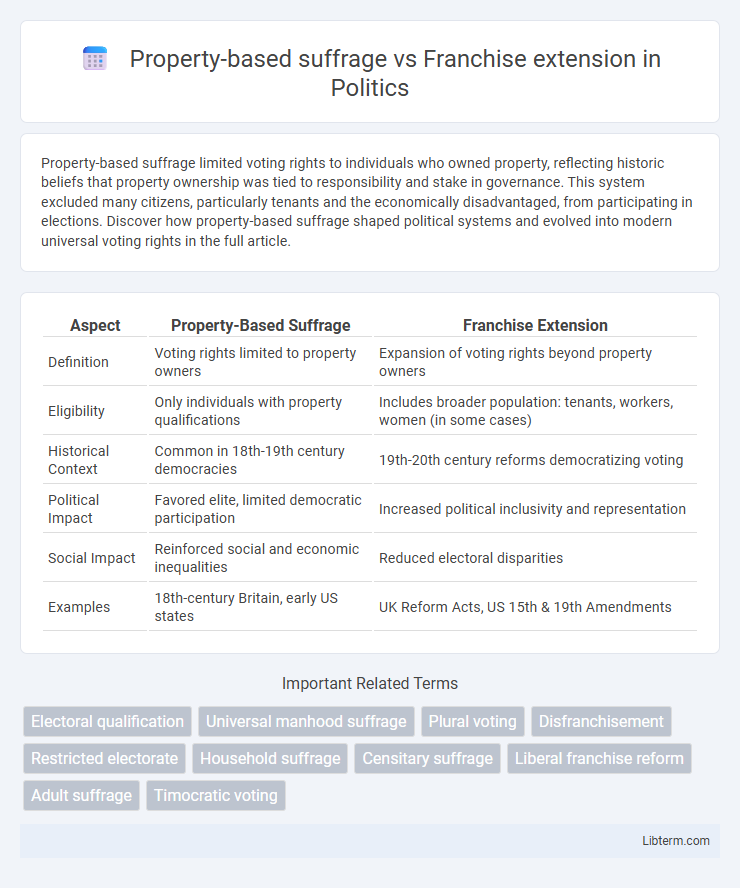Property-based suffrage limited voting rights to individuals who owned property, reflecting historic beliefs that property ownership was tied to responsibility and stake in governance. This system excluded many citizens, particularly tenants and the economically disadvantaged, from participating in elections. Discover how property-based suffrage shaped political systems and evolved into modern universal voting rights in the full article.
Table of Comparison
| Aspect | Property-Based Suffrage | Franchise Extension |
|---|---|---|
| Definition | Voting rights limited to property owners | Expansion of voting rights beyond property owners |
| Eligibility | Only individuals with property qualifications | Includes broader population: tenants, workers, women (in some cases) |
| Historical Context | Common in 18th-19th century democracies | 19th-20th century reforms democratizing voting |
| Political Impact | Favored elite, limited democratic participation | Increased political inclusivity and representation |
| Social Impact | Reinforced social and economic inequalities | Reduced electoral disparities |
| Examples | 18th-century Britain, early US states | UK Reform Acts, US 15th & 19th Amendments |
Understanding Property-Based Suffrage
Property-based suffrage restricted voting rights to individuals who owned a minimum amount of property, often land or real estate, ensuring political power remained with the wealthier classes. This system was rooted in the belief that property owners had a greater stake in societal stability and governance, contrasting with broader franchise extension efforts aimed at including wider demographics regardless of wealth. Understanding property-based suffrage highlights how socioeconomic status historically influenced political representation and limited democratic participation.
The Origins of Franchise Extension
The origins of franchise extension trace back to the shift from property-based suffrage, where voting rights were limited to landowners and wealth holders, toward more inclusive electorates. The gradual dismantling of property qualifications throughout the 19th and early 20th centuries expanded political participation to broader segments of society, reflecting changes in democratic ideals and social structures. Key historical milestones include the Reform Acts in Britain, which progressively lowered property thresholds and paved the way for universal suffrage.
Key Principles of Property-Based Voting
Property-based suffrage restricts voting rights to individuals who own property, emphasizing economic stake and perceived vested interest in political decisions as key principles. This system aims to ensure that voters have a direct investment in community stability and fiscal responsibility, linking property ownership to political influence. Critics argue that it limits democratic participation by excluding non-property owners, while proponents claim it safeguards governance from transient or non-invested populations.
Historical Evolution of Voting Rights
Property-based suffrage limited voting rights to individuals owning specific amounts of property, reflecting wealth-based political power in early democratic systems. Over time, franchise extension movements expanded voting rights to broader populations, including non-property-owning men, women, and marginalized groups, transforming democratic participation. Key historical milestones include the 19th-century Reform Acts in the UK and the 15th and 19th Amendments in the US, which systematically dismantled property qualifications and racial and gender barriers to voting.
Social Impacts of Restricted Suffrage
Property-based suffrage limited voting rights to individuals owning a minimum amount of property, reinforcing economic disparities by excluding large segments of the population from political participation. The restriction of franchise based on property ownership perpetuated social inequalities, as marginalized groups such as tenants, laborers, and women were systematically disenfranchised. This limitation slowed democratic representation and prevented social reforms aimed at addressing widespread poverty and class-based injustices.
Arguments for Franchise Extension
Arguments for franchise extension emphasize the principle of political equality, asserting that all citizens, regardless of property ownership, deserve the right to vote. Extending suffrage promotes democratic inclusivity and social justice by empowering marginalized groups and reducing systemic inequalities. Historical evidence shows that franchise extension often enhances civic participation and strengthens representative governance.
Property Requirements vs. Universal Suffrage
Property-based suffrage limited voting rights to individuals owning land or meeting certain property thresholds, ensuring political power remained with wealthy landowners and excluding lower-income citizens. In contrast, universal suffrage eliminates property requirements, granting voting rights to all adult citizens regardless of wealth or social status, thereby promoting equal political participation. The shift from property requirements to universal suffrage marks a significant democratization milestone, enhancing representation and inclusivity in electoral processes.
Political Consequences of Voting Reforms
Property-based suffrage limited the electorate to wealthy landowners, reinforcing elite political power and restricting democratic participation, which often resulted in conservative policy outcomes favoring property interests. Franchise extension broadened voter eligibility by removing property qualifications, increasing political engagement among working and middle classes, and driving significant social reforms and more inclusive governance. These voting reforms shifted political landscapes by empowering broader demographics, weakening aristocratic dominance, and facilitating the emergence of mass political parties.
Global Comparisons: Suffrage Systems
Property-based suffrage limits voting rights to individuals owning specific real estate or meeting property value thresholds, historically prevalent in 18th and 19th century Europe and parts of the Americas. Franchise extension refers to the systematic removal of these restrictions, enabling universal or broader suffrage regardless of property ownership, a trend seen during the 20th century in democratic nations worldwide. Countries such as the United Kingdom, the United States, and India illustrate this shift by progressively abolishing property qualifications to enhance electoral inclusivity and political representation.
Future Trends in Electoral Inclusivity
Future trends in electoral inclusivity emphasize the shift from property-based suffrage to universal franchise extension, promoting equal voting rights regardless of economic status. Technological advancements, such as blockchain voting and digital identity verification, aim to reduce barriers to participation and enhance electoral accessibility. Demographic changes and increased advocacy for marginalized groups further drive reforms toward more inclusive and representative democratic systems.
Property-based suffrage Infographic

 libterm.com
libterm.com